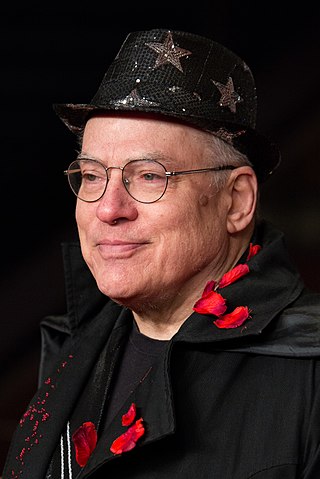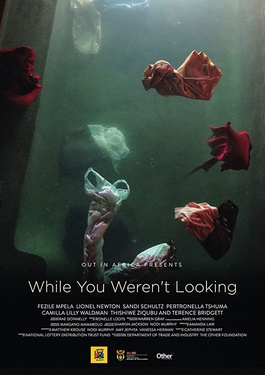"New queer cinema" is a term first coined by the academic B. Ruby Rich in Sight & Sound magazine in 1992 to define and describe a movement in queer-themed independent filmmaking in the early 1990s.
Angela Robinson is an American film and television director, screenwriter and producer. Outfest Fusion LGBTQ People of Color Film Festival awarded Robinson with the Fusion Achievement Award in 2013 for her contribution to LGBTQ+ media visibility.

Jenni Olson is a writer, archivist, historian, consultant, and non-fiction filmmaker based in Berkeley, California. She co-founded the pioneering LGBT website PlanetOut.com. Her two feature-length essay films — The Joy of Life (2005) and The Royal Road (2015) — premiered at the Sundance Film Festival. Her work as an experimental filmmaker and her expansive personal collection of LGBTQ film prints and memorabilia were acquired in April 2020 by the Harvard Film Archive, and her reflection on the last 30 years of LGBT film history was published as a chapter in The Oxford Handbook of Queer Cinema from Oxford University Press in 2021. In 2020, she was named to the Out Magazine Out 100 list. In 2021, she was recognized with the prestigious Special TEDDY Award at the Berlin Film Festival. She also campaigned to have a barrier erected on the Golden Gate Bridge to prevent suicides.
NewFest: The New York Lesbian, Gay, Bisexual, & Transgender Film Festival put on by The New Festival, Inc., is one of the most comprehensive forums of national and international LGBT film/video in the world.

Holger Bernhard Bruno Mischwitzky, known professionally as Rosa von Praunheim, is a German film director, author, producer, professor of directing and one of the most influential and famous queer activists in the German-speaking world. A pioneer of Queer Cinema and gay activist from the very beginning, von Praunheim was a key co-founder of the modern lesbian and gay movement in West Germany and Switzerland. He was an early advocate of AIDS awareness and safer sex. His films center on queer-related themes and strong female characters, are characterized by excess and employ a campy style. They have featured such personalities as Keith Haring, Larry Kramer, Diamanda Galás, William S. Burroughs, Allen Ginsberg, Judith Malina, Jeff Stryker, Jayne County, Divine, Charlotte von Mahlsdorf and a row of Warhol superstars. In over 50 years, von Praunheim has made more than 150 films. His works influenced the development of LGBTQ+ movements worldwide.

Brother to Brother is a 2004 film written and directed by Rodney Evans. The film debuted at the 2004 Sundance Film Festival, where it was awarded with the Special Jury Prize for Dramatic Feature. It went on to play the gay and lesbian film festival circuit where it collected many top festival awards. Brother to Brother was given a limited theatrical release in November 2004.

Billy's Dad is a Fudge-Packer! is a 2004 American black-and-white short comedy film written and directed by Jamie Donahue in her first non-acting effort. It is a parody of the 1950s social guidance films, and depicts the life of a boy learning about adulthood in a traditional family. The apparently innocent account of family life in the 1950s is loaded with sexual innuendo. It was made by production company POWER UP.
Outfest is an LGBTQ-oriented nonprofit that produces two film festivals, operates a movie streaming platform, and runs educational services for filmmakers in Los Angeles. Outfest is one of the key partners, alongside the Frameline Film Festival, the New York Lesbian, Gay, Bisexual, & Transgender Film Festival, and the Inside Out Film and Video Festival, in launching the North American Queer Festival Alliance, an initiative to further publicize and promote LGBT film.

The Frameline Film Festival began as a storefront event in 1976. The first film festival, named the Gay Film Festival of Super-8 Films, was held in 1977. The festival is organized by Frameline, a nonprofit media arts organization whose mission statement is "to change the world through the power of queer cinema". It is the oldest LGBTQ+ film festival in the world.

Woubi Chéri is a 1998 French/Ivorian documentary that shows a few days in the life of various members of the gay and transgender community in Abidjan, Côte d'Ivoire. It is one of the very few films from Africa to deal with LGBT issues.

Word Is Out: Stories of Some of Our Lives is a 1977 documentary film featuring interviews with 26 gay men and women. It was directed by six people collectively known as the Mariposa Film Group. Peter Adair conceived and produced the film, and was one of the directors. The film premiered in November 1977 at the Castro Theatre in San Francisco and went into limited national release in 1978. It also aired on many PBS stations in 1978.
My Super 8 Season is a 2005 French film by Alessandro Avellis that deals with gay and lesbian issues.
Mohamed Camara is a Guinean film director and actor based in France. He studied at the Atelier Blanche Salant in Paris. He has explored controversial topics in his films such as incest (Denko), child suicide (Minka) and homosexuality (Dakan). 1997's Dakan has been called the first film on homosexuality by a Black African.
The Mardi Gras Film Festival is an Australian LGBTQ+ film festival held in Sydney, New South Wales annually as part of the Sydney Gay and Lesbian Mardi Gras celebrations. It is organised by Queer Screen Limited, a non-profit organization, and is one of the world's largest platforms for queer cinema.
The modern South Korean LGBTQ rights movement arose in the 1990s, with several small organizations seeking to combat sexual orientation and gender identity discrimination.

The following outline offers an overview and guide to LGBTQ topics:

The Melbourne Queer Film Festival (MQFF) is an annual LGBT film festival held in Melbourne, Victoria, Australia in November. Founded in 1991, it is the largest queer film event in the Southern Hemisphere, in 2015 attracting around 23,000 attendees at key locations around Melbourne.

While You Weren't Looking is a 2015 South African drama film directed by Catherine Stewart. The film examines the struggles experienced by lesbians living in suburban South Africa compared to those living in townships.
There are many Mexican LGBT+ films, a genre that has developed through the film history of the country since the 1970s.

Queer Japan is a 2019 documentary film directed, edited, and co-written by Graham Kolbeins. The documentary profiles a range of individuals in Japan who identify as lesbian, gay, bisexual, transgender, and queer (LGBTQ). Queer Japan is produced by Hiromi Iida with Anne Ishii, written by Ishii and Kolbeins, and features an original score composed by Geotic.











